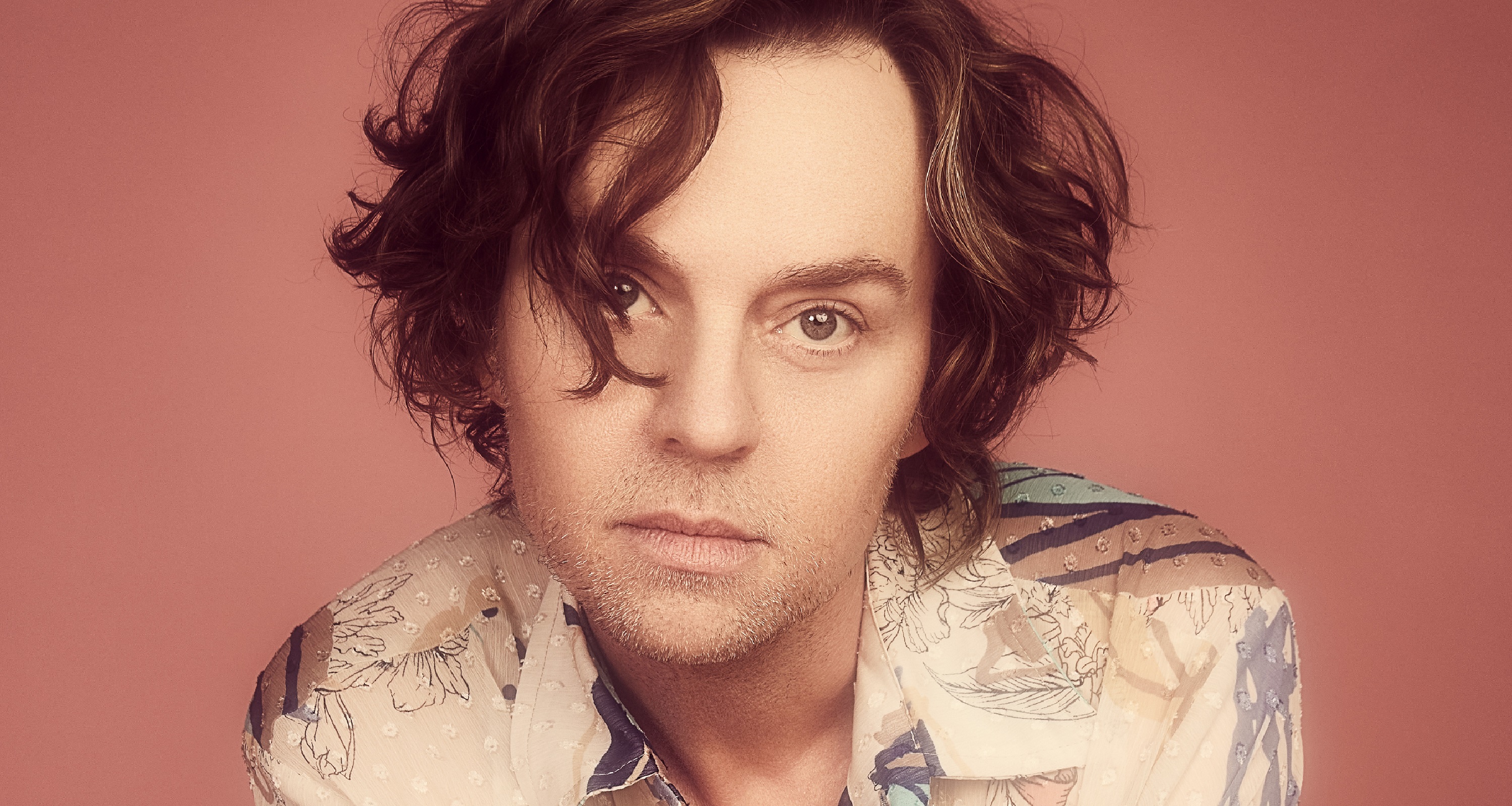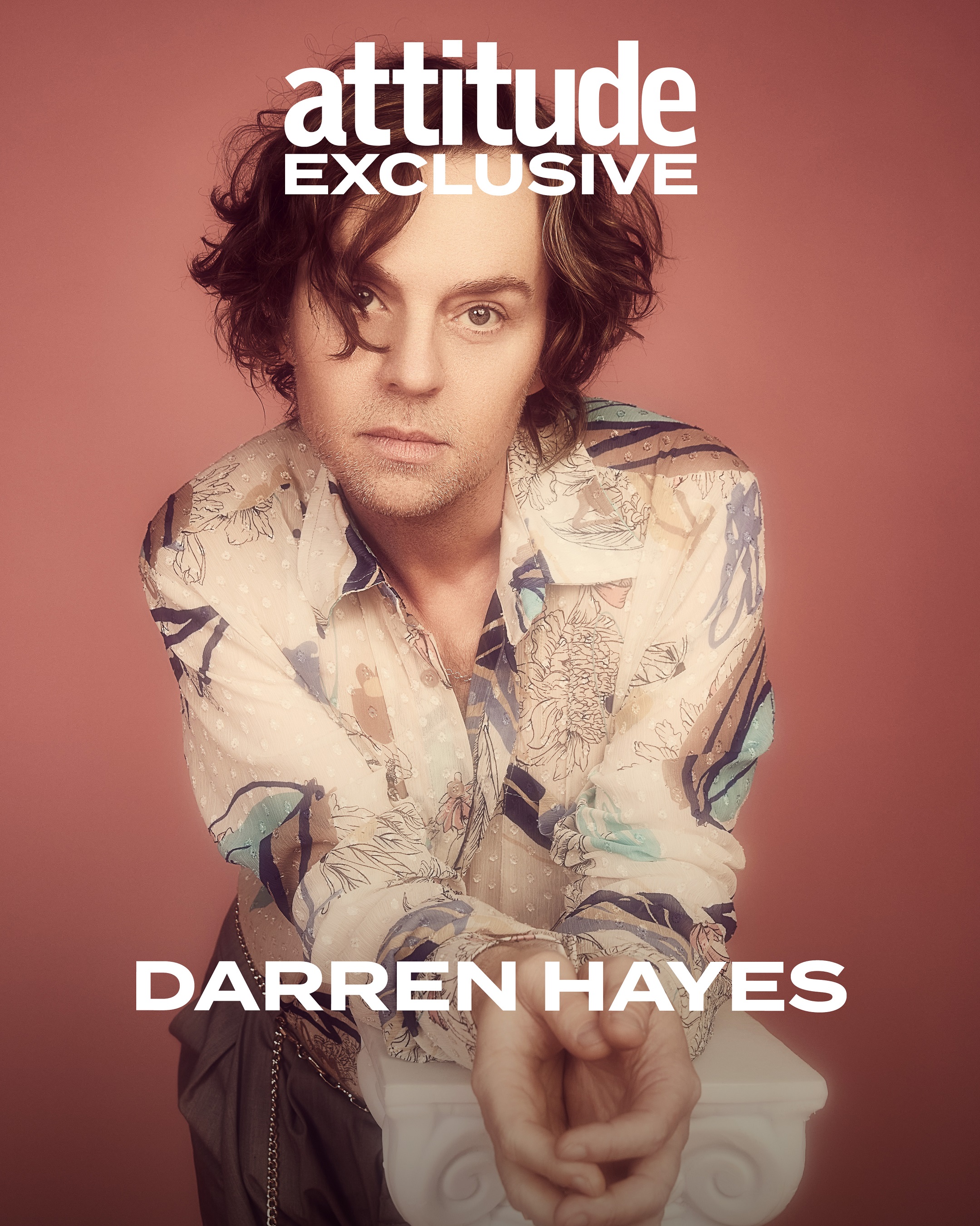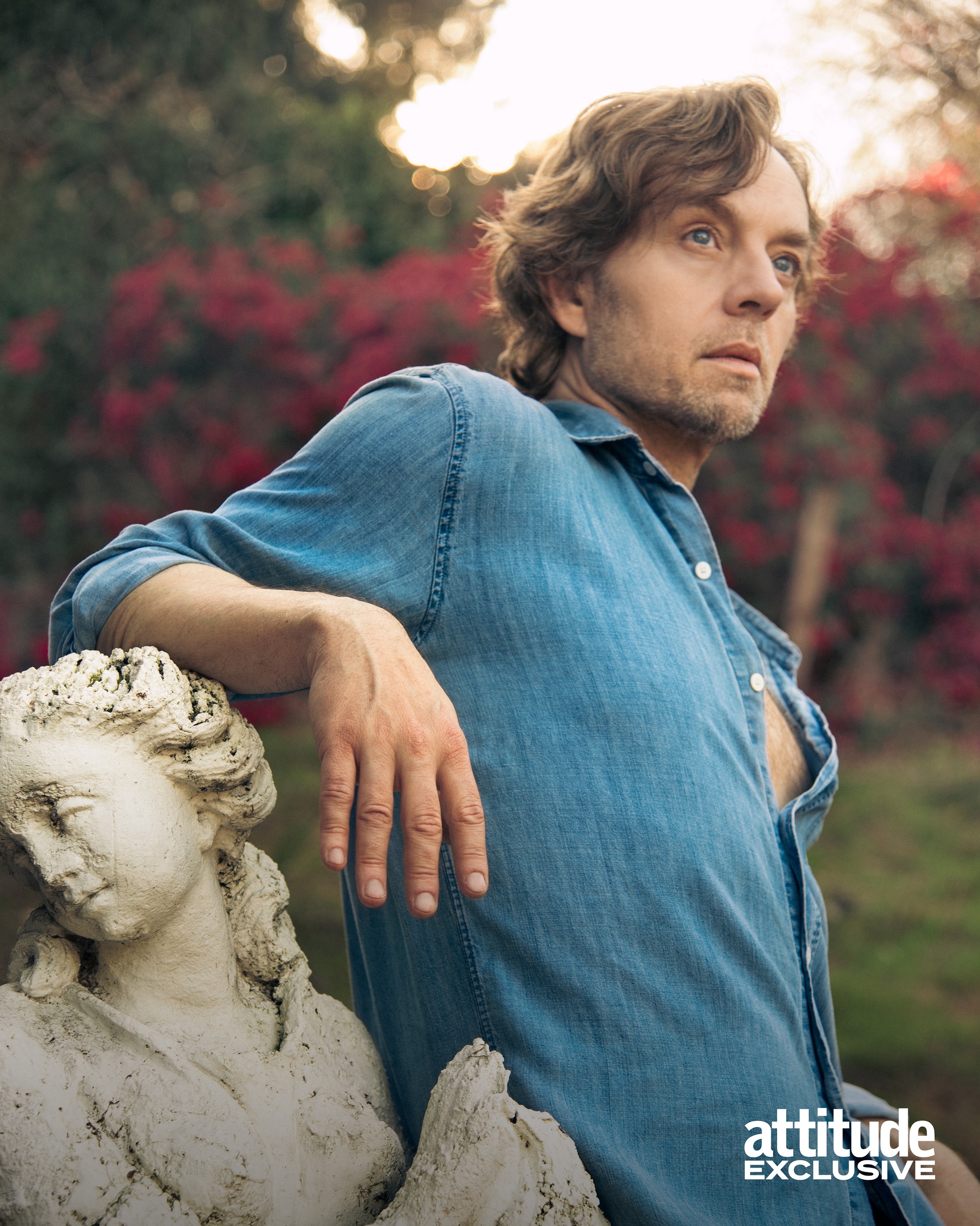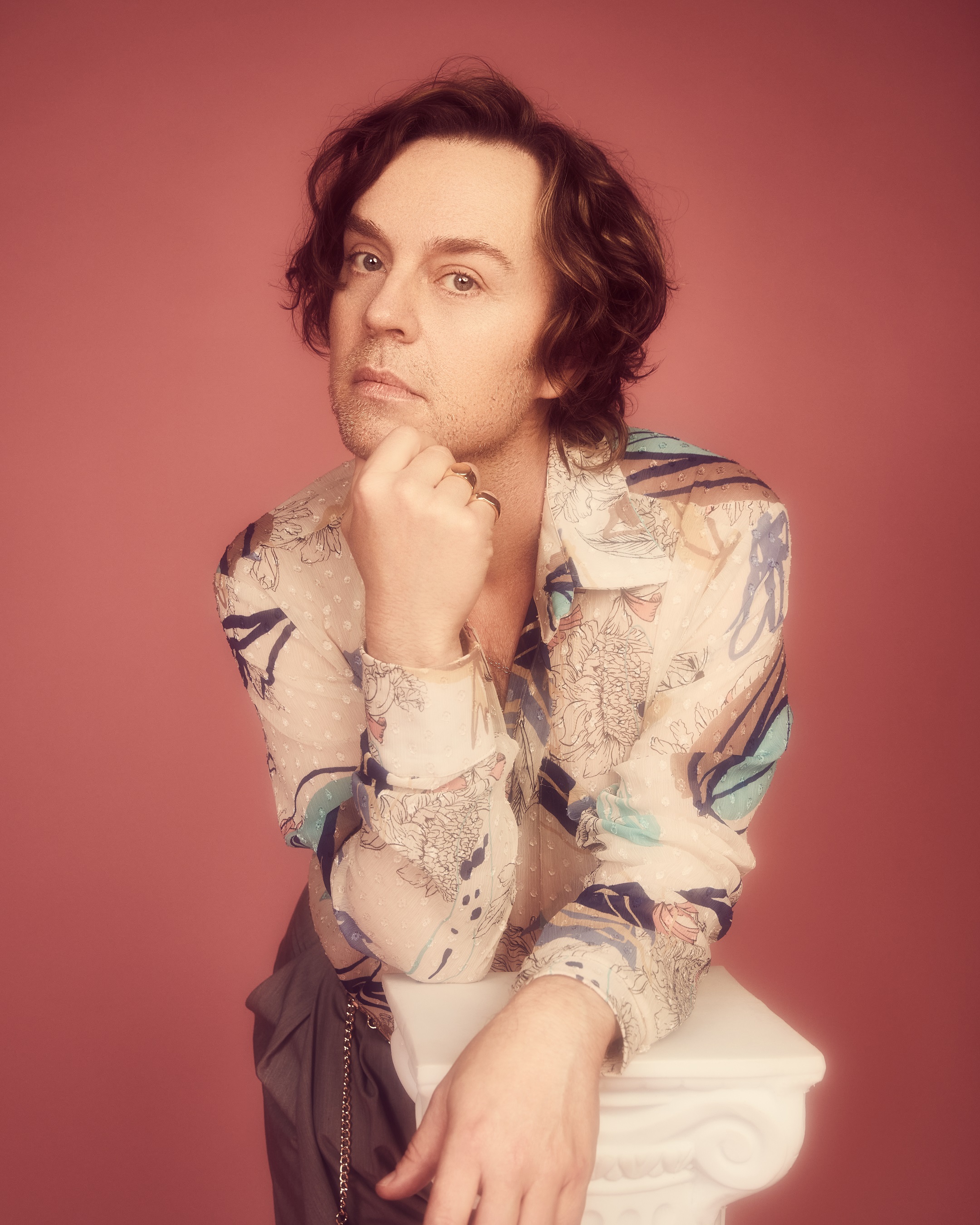Darren Hayes: The music industry is due a ‘reckoning’ over homophobia
The former Savage Garden frontman has rediscovered his voice after a decade away from music and it's louder - and prouder - than ever.
By Will Stroude

Words: Will Stroude; Images Supplied
“When I left I didn’t plan to make a big deal about it,” chirps Darren Hayes in his trademark Aussie lilt. “I am gay, but I’m not that dramatic.”
When the former Savage Garden frontman stepped off stage following a solo gig at The Brighton Dome in 2012, he fell into his husband’s arms and cried. Unbeknownst to the audience of devoted fans on the other side of the curtain, the show was to be his last.
“I’d just sort of had my fill”, Hayes tells Attitude as he returns to music for the first time in a decade with effervescent synth-pop tracks ‘Let’s Try Being In Love’ and ‘Do You Remember?’ “I felt like all the colour had drained out of me… Something had gone from me, and I couldn’t bear to let the world see that.”
Over the course of the preceding 20 years, Hayes had experienced the full gamut of music industry highs and lows: As one half of pop colossus Savage Garden, the Brisbane-born star had topped the US Billboard charts, performed at the Closing Ceremony for the 2000 Sydney Olympics and become the voice of late ’90s commercial radio, all while navigating the breakdown of his first marriage to childhood sweetheart Colby Taylor and coming to terms with being gay.

After Savage Garden’s inexorable split in 2001, a major label solo career followed with 2002’s Spin, which was hampered by record executive politics, and 2004’s The Tension and the Spark, which despite critical acclaim failed to ignite the charts and prompted a split with Colombia Records in 2006 – the same year he entered a civil partnership with screenwriter Richard Cullen and came out publicly. Two independently-released albums – 2007’s This Delicate Thing We’ve Made and 2011’s Secret Codes and Battleships – allowed Hayes greater freedom in his artistry, but as he approached 40 he realised that his passion for music was no longer enough to fill whatever void had been created all those years before before as a confused young adolescent.
“I was a kid from a working class town, I had a dad who beat the s**t out of my mother every night and was an alcoholic, I was bullied mercilessly at school for being gay, didn’t realise I was gay but was told I was gay before I even knew what it was”, says Hayes matter-of-factly. “The first person who ever called me the F-word was my dad.”
He continues: “Through all this trauma in my childhood, I had completely disassociated; I had created a persona. I’d become a popstar, I’d got married to a woman, I’d squashed down my sexuality, I’d travelled round the entire world, I’d had Number Ones in America… I was another one of those entertainers with that had a God-shaped hole in them, and I thought that if I just became famous and people clapped for me, that it would fix me.
“And spoiler alert: it didn’t.”
Hayes, who wears his heart boyishly on his sleeve even as he approaches 50, recalls with a chuckle: “I remember having a therapy session once and the therapist saying to me this line, ‘do you really think that you can be mortal?’ And that always stuck with me, because I thought it was really very camp and funny.
“He was like ‘you’re an artist, what are you going to do?’ And I didn’t know what I was going to do, for the first time since I was 13.”
Pop retirement saw Hayes relocate to Los Angeles to support his husband’s screenwriting career, where he found a new creative outlet in improv classes and was rewarded with the “amazing, humbling, sometimes humiliating experience of being a student.”
The time away from the spotlight also gave the former chart-topper plenty of time to process the residual impact of coming to terms with his sexuality at the height of his fame – something he readily admits had at times left him feeling “suicidal”.

“There were moments where people would have to check on me and make sure I was awake some mornings. My experience of being gay until I met my husband was just so shrouded in what I now realise was just shame; gay shame.”
Hayes’ sexuality was no secret to family, friends and music industry insiders by the time Savage Garden called it quits in 2001, or even to many of his fans (he famously winked directly into the camera on The Tonight Show with Jay Leno as he sang the lyric “I believe you can’t control or choose your sexuality” during a performance of ‘Affirmation’). But as an early noughties heart-throb, a public coming out remained unthinkable as far as his professional bosses were concerned.
“I was witness to some of the most homophobic conversations”, recalls Hayes with disgust, before fervently reconfirming that record label execs were “completely aware” he was gay at the time.
“I heard some of these men in suits say things about Ricky Martin and other artists at the time that were so offensive. And they said them in front of me without any fear of repercussion.”
Hayes has recounted before how the video for his 2002 debut solo single ‘Insatiable’ was re-shot after an intervention from the record label, and the details remain wince-inducing.
“They made me re-shoot because they thought it was ‘too gay’,” he sighs, letting the words hang in the air. “It was so insidious the way it occurred.”
“They knew I was gay, but they realised in this almost parallel Elvis Presley universe that when I moved it was ‘obvious’ I was gay… they were so paranoid that the world would realise I was gay that they panicked.
“Not only did they scrap the video, but they also shot secret footage of a female storyline, and it was a woman in a trench coat, who was naked, and this woman in the trenchcoat was searching for me in this video and – unbeknownst to me – they were going to splice it into this cut.”
Gathering pace, he adds: “They needed to heterosexualise me so they straightened my hair. They had focus groups decide what my hair would look like. They decided that I couldn’t be in a sexual situation so I had to be the observer, but they still had to had a romantic situation so I was there looking like an idiot, just watching some love story.”
Soon after the video debacle, Hayes’ scheduled US TV promo performances were pulled. “They felt that if I performed on television that I would perform like I did in that video, so they wouldn’t let me perform,” he says. “So I had no promotion in the US. The launch of my album after selling 30 million albums… was a meet and greet. They did a meet and greet with me and then they shipped me off to Europe, and then they buried me.”
Two decades on, and with ten years away from the music industry to reflect on his treatment, does Hayes still hold any resentment?
“Yes”, comes the immediate reply, before a brief pause. “Resentment’s probably not the right word… I am just starting to realise that there’s probably a movement coming within the music industry in the same way there was a reckoning for women in the film industry.
“I think there’s definitely a reckoning coming in terms of homophobia. Because there’s so much I just accepted that I look back on and realise ‘I can’t believe I let that happen to me’.”
Hayes’ experiences are sadly not unique. Boyzone’s Stephen Gately, Westlife’s Mark Feehily, *NSYNC’s Lance Bass, Ricky Martin: all were victims of a musical landscape that spent much of the ’90s and early noughties rowing back on the sexual liberation of the ’70s and ’80s in favour of straight-washed, shiny pin-up pop.
“It’s funny, we never spoke to each other [but] I met Ricky [Martin] a couple of times and I didn’t even know Ricky was gay”, Hayes exclaims. “I just heard how the record company spoke about him. I met Lance Bass a couple of times and I had no idea he was gay.
“Also, I have a terrible gaydar, I’m not kidding you when I tell you that. I didn’t know George [Michael] was gay until all of that came out.”
He adds: “We were all very much I think terrified.”
Hayes’ years away from music provided him with the space he needed to reflect on his relationship with his sexuality, but it was his “visceral reaction” to watching Luca Guadagnino’s aching big screen adaptation of Andre Aciman’s coming-of-age story Call Me By Your Name that eventually reignited his creative musical spark.
“I went back to see it again and again and I kept crying and I realised I was in grief,” he explains. “Part of it was that feeling that I never truly celebrated my homosexuality.

“It was a wake-up call when I watched that film, that there was so much passion in there, and that passion was missing in my life: not just from music but from this teen-hood I’d never had, it was missing from the peak of my career when I was on stage and deflecting all this sexual energy that was being thrown at me, but I couldn’t accept it.”
The realisation shaped the gloriously uninhibited direction of Hayes’ comeback: Songs began pouring from him organically and by the end of 2019 he’d resolved to make a full-time return to music. “I was on the search for this… ecstasy”, he enthuses. “This ecstasy within sound, within myself, within our marriage, and it began with this exploration of just sound.
The ‘Truly Madly Deeply’ singer adds breathlessly: “I came alive. I just woke up.”
Recent singles ‘Let’s Try Being In Love’ and ‘Do You Remember?’ have seen Hayes back “in the driver’s seat” as an artist, with exhuberant music videos he’s written and co-directed himself as he finds a new lease of queer life that rejects desexualised ‘guncle’ depiction of middle-aged gay men. (“I call it the Will & Grace effect”, observes Hayes.)
He notes: “‘Let’s Try Being In Love’ was not just about romantic love; it was like, in love with being gay, in love with having sex, in love with sound and fashion and colours.”
The video for ‘Let’s Try Being In Love’ saw Scott Evans – the out and proud brother of Marvel star Chris – sign up to play Hayes’ love interest after the singer wrote him “the most heartfelt letter” detailing his earlier experiences of homophobia in the industry. After staying up anxiously all night, Hayes received a reply first-thing the next morning.
“He related hard,” reveals Hayes. “I got a message from him back and he basically said, ‘Would I consider it? Are you kidding me! I would love to do this’. He essentially said the story really moved him and he would love to do it. He has his own experience of being outed: he has his own experience of being, I think, reduced to just his sexuality.”
The shoot itself proved to be the final piece of the puzzle that would see the rebirth of Darren Hayes, queer pop star.
“I got to experience what I never got to experience in the real world,” he admits. “You know, I didn’t get to go to G-A-Y and kiss a boy on the dancefloor, but [Scott] let me almost go back and rewrite my memories, and he was such a powerful actor that every time they yelled ‘action’ he would just look at me and make me feel like I was 17.
“It healed something in me. It was really cathartic. If there was any residual homophobia left in me – and I think if we’re honest most queer people have to go through a process of ridding ourselves of that – he helped me leave that on the dancefloor.”
The music industry has been irrevocably transformed for LGBTQ artists since Hayes last released an album (he’s full of praise for the “tenacity” and “f**king rebelliousness” of Lil Nas X) but this new musical era marks a very personal kind of victory: One only needs to contrast the image of Hayes communicating his sexuality through just a wink during that infamous Jay Leno appearance to the one of him proudly striding out from under a 50-foot Progress Pride flag while headline Sydney Mardi Gras earlier this month to see why.
“I guess in the last 10 years or so I’ve realised that my queerness is a huge part of who I am, in the same way that being an artist and a singer is a huge part of my soul,” he concludes.
“To answer that therapist’s question, ‘can you be mortal?’ No, I can’t. I can’t be someone that doesn’t create, just like I can’t be someone that doesn’t love men.
“It’s a part of my DNA.”
Darren Hayes’ new single ‘Do You Remember’ is available to stream and download now.
